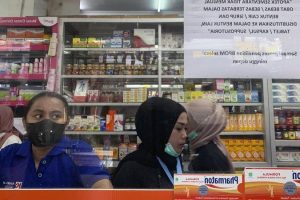Australia sends antidote to Indonesia amid surge of ‘cough syrup’ child deaths

Singapore: Australia has sent vials of a “rare” antidote for chemical poisoning to Indonesia after 133 children died from acute kidney damage linked to tainted cough syrup.
Indonesia last week suspended nationwide sales of all syrup-based medicine as the government in Jakarta launched an urgent investigation into the fatalities and dozens of other cases across 22 provinces over a two month period.
Employees wait for customers at a counter displaying a notification saying that the sale of medicinal syrup is temporarily halted at a pharmacy in Jakarta.Credit:AP
More than half of the 241 children recorded to have sustained acute kidney injuries have died and the majority have been under the age of five.
Indonesia has confirmed that toxic substances ethylene glycol and diethylene glycol were found in the bloodstreams of toddlers and had been discovered in medicinal syrup products in the households of some of those afflicted.
Now, with children still gravely ill, President Joko Widodo’s government has turned to Australia for help.
Indonesia Health Minister Budi Gunadi Sadikin said he had called Australian counterpart Mark Butler to source an urgent batch of fomepizole, a medication used to treat patients who have suffered poisoning from methanol and ethylene glycol.
Indonesia Health Minister Budi Gunadi Sadikin reached out to Australia.Credit:Bloomberg
Australia had provided 16 vials and Singapore a further 10 vials, he said.
“This drug is still rare … I called the health ministers of Singapore and Australia [and they] immediately gave it,” Sadikin said.
Butler said the vials were being flown to Indonesia on Monday.
“Our Indonesian neighbours reached out to us for urgent help treating children tragically poisoned with contaminated paracetamol,” Butler said.
Health Minister Mark Butler.Credit:Luis Ascui
“There are limited supplies internationally of the drug fomepizole and I’m glad our government was able to source 16 vials to donate.”
The assistance from Australia and Singapore will top up supply in Indonesia, where patients being injected with a 1.5ml dose each, according to the health ministry.
A chemical commonly used in automotive products such as antifreeze and brake fluid, ethylene glycol can be deadly even if ingested in small amounts and fomepizole can stop the body metabolising it if it is administered quickly.
The Indonesian Food and Drug Authority, called the BPOM, last Friday named five cough syrup medicines it had found to be contaminated with chemicals that exceeded the safe limit, and is conducting a probe into hundreds of other drugs and their ingredients.
Sadikin said the substances were impurities of non-dangerous liquids regularly used to enhance solubility in cough syrup medicine, warning there may be many more unreported cases across the Indonesian archipelago.
Indonesia has not established a connection between its latest health crisis and the deaths of 70 children from acute kidney injury in the Gambia, which are being investigated by the World Health Organisation.
Paracetamol syrups imported by the west African country from India are suspected to be responsible for those fatalities.
The WHO has said four products manufactured by Indian company Maiden Pharmaceuticals and shipped to the Gambia had contained “unacceptable” levels of ethylene glycol and diethylene glycol and Maiden has since been ordered to cease production at its factory outside Delhi.
Jakarta maintains that the four products produced by the company and identified by the WHO had not been for sale in Indonesia.
But Professor Arry Yanuar, Dean of the School of Pharmacy at the University of Indonesia, said the Indonesian government “must investigate what the source of these substances are because they are not substances [used in producing drugs]“.
“Maybe the raw materials were contaminated,” he said. “It is BPOM’s duty to investigate.”
Indonesia’s food regulator has now issued a list of cough syrup medicine brands that it has deemed safe to consume.
Get a note direct from our foreign correspondents on what’s making headlines around the world. Sign up for the weekly What in the World newsletter here.
Most Viewed in World
From our partners
Source: Read Full Article



